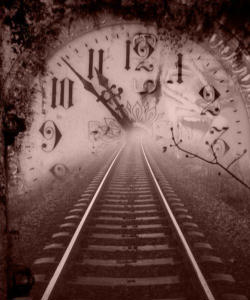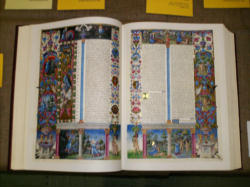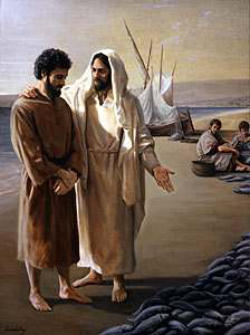 The ancients were fond of a Latin phrase “Carpe Diem”, which literally means “Seize the day.” For we who are living in Christ Jesus, that phrase can take on a whole new meaning. We always journey toward the “Day of the Lord”, when He will return as King. We should seize that day as the reference point for all things.
The ancients were fond of a Latin phrase “Carpe Diem”, which literally means “Seize the day.” For we who are living in Christ Jesus, that phrase can take on a whole new meaning. We always journey toward the “Day of the Lord”, when He will return as King. We should seize that day as the reference point for all things.
Human beings have always marked time by significant events. The real question is not whether we will mark time, but how we will do so. What events and what messages are we proclaiming in the calendaring of time? For the Christian, time is not a tyrant ruling over us. Rather, it is a teacher, instructing and presenting us with opportunity. Rather than a foe, it is a friend. Its role and reach is a part of the redemptive loving plan of God. In the Incarnation, the eternal Word became flesh; breaking into time to transform it from within.
He now gives us time as a gift, having removed the curse by defeating death. Time becomes a field of choice wherein we can grow in holiness and freedom. We participate in God’s plan to recreate the entire cosmos in and through Jesus Christ. Time is the road along which this loving plan of redemption proceeds. We who have been baptized into Christ participate in this plan by living in the Church, the seed of the eternal kingdom.
Christians believe in a linear timeline in history. There is a beginning and an end, a fulfillment, which is a new beginning. Time is heading somewhere. That is as true of the history of the world as it is our own personal histories. Christians mark time by the great events of the Life, Death and Resurrection of Jesus Christ. We are moving toward His loving return. We mark our Christian culture with events of importance from the ongoing “family”, history of the Church.
The members of that family were birthed from the wounded side of the Savior on the Cross-at Calvary’s hill. That family was sent on mission when He breathed His Spirit into them at Pentecost. We remember them, and walk with them, so that we have models and companions for the journey of life. They are that “great cloud of witnesses” the author of the letter to the Hebrews discusses. They will welcome us into eternity and help us now along the daily path.
Our Catholic liturgical year follows a rhythmic cycle. It points us toward beginnings and ends and, in so doing, emphasizes an important truth that can only be grasped through faith, every end is a beginning. In our liturgical life, no sooner than we have celebrated the last Sunday of the Year, the feast of Christ the King, we celebrate the First Sunday of Advent, and we prepare for the birth of Savior. Our Christian faith proclaims that Jesus Christ is the “Alpha”, (the first letter of the Greek alphabet) and the “Omega” (the last letter), the beginning and the end. He is the Giver, the Governor and the fulfillment of all time.
So it is with each day, there is a Divine design. Every morning invites us to begin again. The very structure of the 24 hour cycle of each day reveals the goodness of a God who always invites us – and empowers us – to begin again. Hope is reborn with every sunrise. Every evening invites our honest reflection, expression of gratitude to the Lord who gave us life, repentance for where we fell short, new choices to amend our life and the healing, rejuvenating rest in the Lord which awaits all who live in Him. Then, the sun invites us to begin again by saying “yes’ to the Lord’s choice and invitation of love. Our time is to be filled with bearing the fruit that remains in the garden of grace called daily living.
These truths concerning time can have ever-increasing meaning for us as we grow in the life of grace. They are meant to change us. They invite us into a deeper walk with the Lord and with one another. It is now up to us to respond to the lessons of time and the invitation of faith. Life is a classroom for those who are willing to learn and faith opens our eyes and shines light on the way. Let’s reflect on two of the many lessons.
Every End is a Beginning
As we move from one Church year to the next, we also move along the in the timeline of human life allotted to each one of us. We age. The certainty of our death is meant to illuminate our life and the certainty of the end of all time and the coming of the Lord is meant to illuminate time’s very purpose and fulfillment in Christ. Death can become a second birth. Francis of Assisi prayed these words in his most popular prayer ” it is in dying that we are born to eternal life.” He referred to death as a “sister” implying that he had a relationship with it. So too did all of the great heroes our Church, the saints.
Do we view death in this way? Is death a catastrophe to be avoided, a source of fear? Or, as we age, is death becoming a friend, a companion who beckons us on to a more meaningful, redemptive life? Is death becoming a “sister” whom we will welcome in due time? Do we believe that it is simply a change of lodging, a passage to a new birth in the Lord? The author of the Book of Wisdom reminds us that “God did not make death and He does not delight in the death of the living” (Wisdom 1:13).
We recall the tender moment recorded for us in St John’s Gospel where Jesus, brokenhearted at the death of his friend Lazarus, comforts his sister Martha with these words “everyone who lives and believes in me will never die. Do you believe this? I am the Resurrection and the Life; he who believes in me, though he die, yet shall he live, and whoever lives and believes in me shall never die.” (St. John 11: 25 and 26) Do we believe this?
Jesus Christ abolished death and brought us eternal life by removing what St. Paul calls “it’s sting”; it’s essential evil, separation from God and the eternal love which is communion with God. He robbed death of its power over us through His Resurrection. He made that tombstone a stepping stone, a portal to eternal life. Jesus converted death, once the “last enemy”, into our friend and sister, a portal to life eternal. We are invited to begin living in the eternal “now” of life in communion with God the Father, in the Son and through the Holy Spirit.
With a few exceptions like John the Baptizer and Our Lady (for whom we celebrate birth and death) we Christians celebrate the death of Saints. That is because our faith proclaims that death is not an end but the beginning of an eternal life in God. In the final book of the Bible we read: “Here is what sustains the holy ones who keep God’s commandments and their faith in Jesus. I heard a voice from heaven say, “Write this: Blessed are the dead who die in the Lord from now on.” “Yes,” said the Spirit, “let them find rest from their labors, for their works accompany them. Then I looked and there was a white cloud, and sitting on the cloud one who looked like a son of man, with a gold crown on his head and a sharp sickle in his hand. Another angel came out of the temple, crying out in a loud voice to the one sitting on the cloud, “Use your sickle and reap the harvest, for the time to reap has come, because the earth’s harvest is fully ripe. So the one who was sitting on the cloud swung his sickle over the earth, and the earth was harvested.” (Revelations 14: 12-15)
Time is for bearing a harvest for the Lord
As the Apostle John records in the Revelation he received on the Island of Patmos, our “use” of time is meant to bear good fruit. We are called to bear a harvest which will accompany us into eternity. It will – if we have an intimate relationship with the One who both gives and governs time. Time is the opportunity for the Christian to bear “fruit that remains”. Jesus reminds us “It was not you who chose me, but I who chose you and appointed you to go and bear fruit that will remain, so that whatever you ask the Father in my name he may give you. This I command you: love one another” (St. John 15: 16, 17).
We decide whether we use time for bearing good fruit or are used by time as a tyrant who frightens us as we fruitlessly try to resist his claim on our perceived youth. This act of choosing rightly helps us to develop a disposition; a way of living that involves the proper exercise of our human freedom aided by grace. When time is welcomed as an opportunity for bearing the fruits of love and holiness, we receive it in love, perceive it as a field of choice and build an environment for holiness. We choose to fill our lives with love and pour ourselves out for the God of love. When we live this kind of life, Jesus can find a home within us from which He continues His redemptive mission, in time.
The ancients were fond of a Latin phrase “Carpe Diem”, which literally means “Seize the day.” For we who are living in Christ Jesus, that phrase can take on a whole new meaning. We always journey toward the “Day of the Lord”, when He will return as King. We should seize that day as the reference point for all things. We participae in His ongoing redemptive mission when we live our lives as though His day is the milestone and marker for all that we do. It shines the light for the path as he makes us new.
Almost two thousand years ago the ancient Greek writer, Seneca, wrote: “It is not that we have so little time, but that we have wasted so much of it” St. Paul wrote to Greek Christians, centuries later in Ephesus: “Look carefully then how you walk, not as unwise men (and women) but as wise making the most of the time.” (Ephesians 5: 15ff). As we consider the timeline of God’s unfolding plan, the redemption of the whole cosmos, the God who gives and governs time, invites us to re-dedicate ourselves to living differently, in time.
We are to live as though time really does matter. We are invited by grace to give ourselves away for others; to imitate the One who gave Himself for the entire human race. We are invited to pour ourselves out as Jesus did. If we live life this way, when we face Him on that final day, we will do so with our arms full of gifts borne over time. These gifts will have paved the way for eternity.

